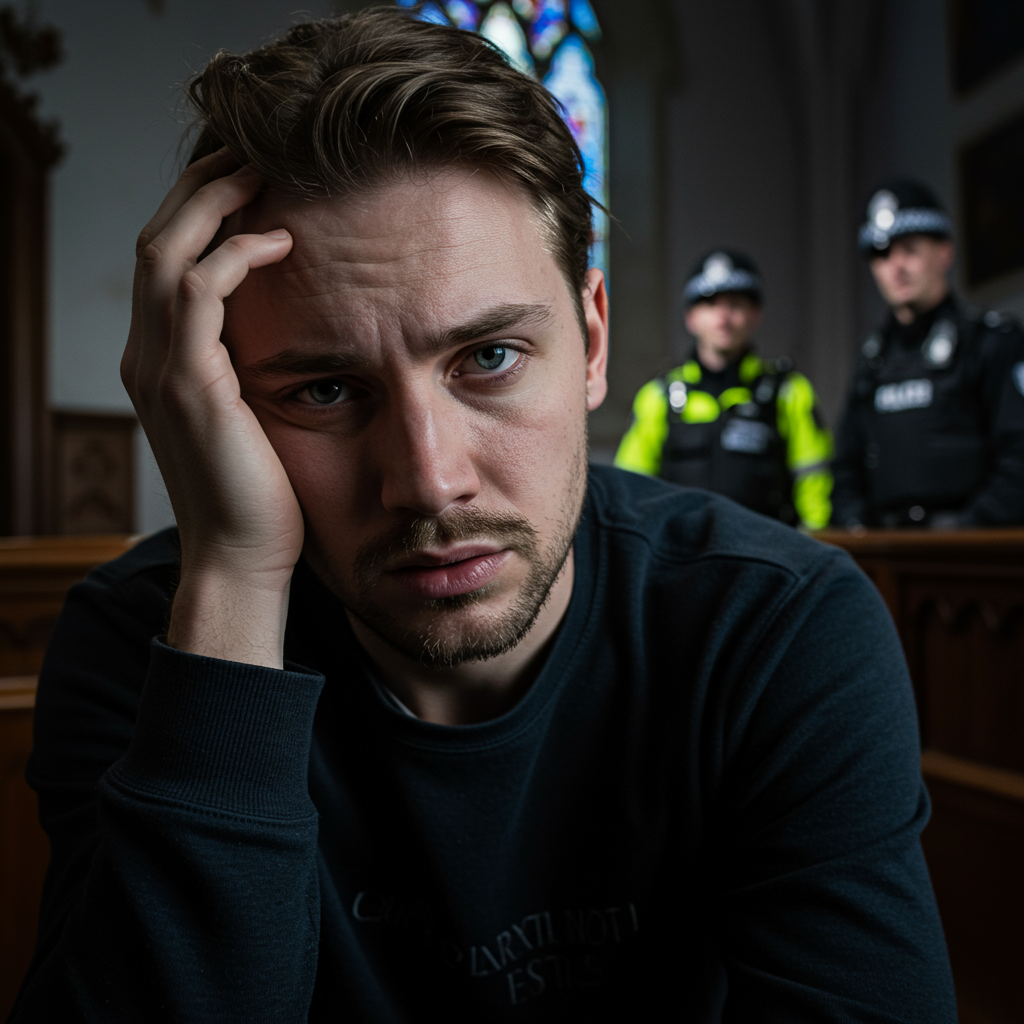Discover the unsettling true story of a church volunteer’s harrowing experience with stalking after simply declining a date. This account reveals not only the devastating impact of relentless harassment but also raises troubling questions about how institutions, specifically the police and the Church of England, handled serious allegations and failed to protect a vulnerable individual. It’s a narrative highlighting the critical need for effective safeguarding protocols and timely intervention when faced with disturbing behaviour.
It started innocently enough in the summer of 2021. Jay Hulme was volunteering at St Nicholas Church in Leicester, greeting visitors. Venessa Pinto, a lay preacher from the Leicester diocese, arrived. Jay initially noted her slight awkwardness but attributed it to being new and the post-pandemic environment. No immediate concerns arose.
Venessa attended Jay’s church a few more times. Their paths crossed again later at a midweek service in Leicester Cathedral. After the service, Venessa asked to speak with Jay privately. They stepped outside into the peaceful cathedral graveyard.
There, Venessa asked Jay out on a date.
Jay was surprised by the request, as he didn’t know her well. He politely explained he was gay and wasn’t available. Venessa then asked if his rejection was because she was Black. Jay was taken aback by this question. He gently reiterated his reasons: his sexuality and not being in a place for a relationship. He left the interaction assuming the awkward encounter was concluded.
The Unforeseen Beginning of a Stalking Campaign
Jay believed the matter was closed. However, it marked the start of a severe and sustained campaign of stalking and harassment. When Jay later sought help and lodged a complaint, the response from high levels within the Church in Leicester was profoundly disappointing. A senior figure, even considered a leading candidate for Archbishop of Canterbury, reportedly doubted Jay’s account. Shockingly, this figure instead made unfounded accusations of witchcraft against Jay.
At the time the events began, Jay Hulme was in his mid-twenties and felt optimistic about his life. He was known as a poet and author. He served as an assistant warden at the LGBT-inclusive St Nicholas Church. Online, he shared his passion for church architecture and theology.
Jay was also actively exploring his Christian faith. He was considering training for priesthood in the coming years. As a trans man who had come out years prior, he felt he had finally achieved happiness and saw a positive future unfolding, something he previously thought impossible.
Following Jay’s polite rejection, Venessa, also in her mid-twenties, sent him a series of “angry and accusatory” messages online. She accused him of gossiping about her. Jay attempted to reassure her he wasn’t, but she remained insistent.
Trying to resolve the tension, Jay reluctantly agreed to a meeting Venessa demanded. He intended for them to meet in a public outdoor space. However, heavy rain led them to meet indoors at her place of work, alone. Jay recounts that Venessa yelled at him during this meeting. She called him a liar, a racist, and an awful person. She repeatedly demanded an apology without clarifying what he was supposed to have done wrong.
Feeling unsettled by the encounter, Jay decided to stop interacting with Venessa. He actively avoided her whenever she appeared at his church. Despite this, the harassment continued and escalated. Jay started receiving messages from anonymous online accounts. These messages were visible to his social media followers.
Jay quickly deduced that Venessa was behind these anonymous accounts. She even sent him an email from her personal address, apologizing for the “pain” she had caused. However, the online attacks intensified. Venessa began publicly making false allegations and issuing threats against him.
Seeking Protection: Initial Institutional Responses
Concerned for his personal safety, Jay reported the harassment to Leicestershire Police. At this initial stage, he wasn’t seeking prosecution. His primary goal was simply for the abuse to stop. Unfortunately, he received no feedback from the police, and the harassment continued relentlessly. As soon as he blocked one anonymous account, another would appear. Jay felt trapped with no escape from the constant abuse.
He described feeling as though she was constantly present in his life: “in my pocket, and in my house, and in my brain all of the time, saying these horrendous things.” Jay needed to maintain an online presence for his writing and speaking career. However, the online allegations began affecting his professional life, leading to cancelled contracts. He suspected this was a direct result of the false claims being spread online.
Weeks after his initial report, the police finally visited Venessa. The outcome was far from satisfactory for Jay. Venessa reportedly told the officer that her friends were responsible for the messages. The officer then instructed her to tell her friends to stop. Jay was dismayed when the police advised him to simply delete his social media accounts. He felt the police failed to grasp the severity of the online abuse he was enduring.
The police visit seemed to provoke an even more intense reaction from Venessa. It resulted in another wave of angry messages directed at Jay.
Feeling let down by the initial police response, Jay decided to build an undeniable case himself. He became determined to prove that Venessa, not her friends, was the source of the abuse. He created a meticulous spreadsheet documenting the connections between the numerous anonymous accounts posting abusive content and false allegations. His evidence clearly linked all these accounts back to Venessa.
Having lost confidence in the police, Jay submitted his comprehensive evidence to the Church of England. The Church assured him they would investigate his formal complaint through their HR process.
Hoping for some respite while the Church investigation proceeded, Jay decided to attend a silent Jesuit retreat in rural Wales. A few days after he arrived, a colleague contacted him with alarming news: Venessa had also booked herself onto the exact same retreat. Jay had booked his place at the last minute, and he noted that available slots were limited. Located in a remote area, he found it highly improbable that Venessa’s booking could have been a coincidence. “As far as I’m concerned there is no way that could have happened naturally,” he stated.
Terrified by this escalation of the stalking into the physical world, Jay immediately left the retreat just hours before Venessa was due to arrive. This incident significantly heightened his fear, demonstrating that the stalking was no longer confined to online spaces.
A Shocking Setback: The bishop‘s Disregard
Back in Leicester, Jay finally received positive news from the Church. The HR investigation concluded that Venessa was indeed responsible for the abuse he had reported. This finding brought Jay immense relief; he believed the ordeal was finally over.
However, almost immediately after this confirmation, the situation took a bewildering turn. Jay was summoned to a meeting with the Bishop of Leicester, Martyn Snow. Bishop Snow is a prominent figure often cited as a potential candidate for the next Archbishop of Canterbury. Jay anticipated discussing Venessa’s employment status, expecting she would likely lose her position. Instead, he learned the bishop had conducted his own separate inquiry.
During the meeting, Bishop Snow sat with a thick folder and began questioning Jay about his complaint. He stated, “It’s he said, she said,” effectively dismissing the HR investigation’s findings. The bishop informed Jay he did not believe Venessa had been responsible for the harassment and would not uphold Jay’s formal complaint against her.
Then, Bishop Snow made extraordinary accusations against Jay. Someone had allegedly claimed to see Jay in the church darkness with a candle, suggesting he was conducting a séance. Jay clarified that he was simply praying with a candle, a common Christian practice. The accusation escalated further. Bishop Snow accused Jay of practicing witchcraft. This was based not only on the “seance” claim but also on the fact that Jay had a close friend who worked as a tarot card reader.
Jay described this moment as an “enormous gut punch.” He was being confronted with “made-up allegations” by a person holding significant power and position within the Church. He suddenly realized he had no control over the direction of the meeting. He felt Venessa had somehow influenced the bishop, seemingly incorporating him into her campaign of harassment and using his authority against Jay. “I couldn’t believe it was happening,” he said.
Following this meeting, Jay was reportedly told that Venessa would retain her license to preach. Conversely, he was informed that his own process to begin training for priesthood – a path he was eagerly pursuing – would be “slowed down.”
Jay felt devastated and trapped after his complaint was dismissed by the bishop. The online harassment predictably intensified. The messages contained “really horrific things,” including false accusations of raping children, stealing money, racism, and being a bully. Venessa created fake online accounts impersonating Jay and posting deeply racist content, which she would then screenshot and share publicly to discredit him.
Bishop Snow had suggested to Jay that these allegations were inconsistent with Venessa’s character. However, Jay soon discovered he was far from the only person who had experienced Venessa’s problematic behaviour.
An “Open Secret”: Wider Concerns About Behaviour
A colleague who worked closely with Venessa, Kat Gibson, had reportedly been complaining about her behaviour for over a year before the campaign against Jay began. Kat described Venessa as unpredictable and extremely adversarial. She recalled being “really scared when I was around her,” anticipating “explosive angry outbursts” that seemed impossible to prevent.
Kat added that as the months passed, approximately 30 people from eight different churches approached her to informally share their own concerns and complaints about Venessa’s conduct. According to Kat, Venessa’s behaviour was an “open secret” within the diocese, yet managers appeared reluctant or unable to effectively address it.
In response to these wider concerns, a joint statement from Kat’s manager (now Bishop Lusa Nsenga Ngoy) and the Leicester Diocese indicated that pastoral support and counselling were offered to those affected. The Church of England has stated that Kat’s complaints were treated with care and seriousness.
Despite the mounting concerns and the ongoing stalking campaign against Jay, Venessa Pinto’s profile within the Church of England paradoxically rose. In 2022, several months into her relentless harassment of Jay, she was elected onto the Church’s national assembly, the General Synod. Shortly thereafter, she was appointed to the Crown Nominations Commission, a significant body responsible for selecting new bishops and archbishops. All the while, she continued sending Jay countless sinister messages.
The online harassment escalated further. Venessa posted extreme pornographic content on Jay’s social media feeds. She then tweeted his home address, a dangerous act known as doxxing. This final escalation led Jay to contact the police for a second time. Again, he felt a lack of urgency from the authorities.
Jay’s fear for his safety became acute. He described a period where he would “wake up screaming because I dreamed that I was being murdered by Venessa.” He took steps to increase his physical safety, installing extra locks on his door.
Justice Prevails, But Questions Remain
Though there appeared to be little outward action, events were unfolding behind the scenes within the Church leadership. While Jay was told in the summer of 2022 about the Leicester Diocese HR investigation finding Venessa responsible, he was also informed of Bishop Snow’s contrary decision. The BBC later learned that shortly before this, the bishop had told Venessa to step back from ministry due to “her behaviour,” though the specific reasons were undisclosed. He also later revoked her license to preach following the emergence of “new evidence.” The diocese also suggested she take a leave of absence. Crucially, none of these actions were made public, nor did they stop the relentless stalking of Jay.
Suddenly, in late 2022, the Leicester Diocese publicly announced Venessa would be leaving her role. The statement said she would “pursue other opportunities” and thanked her for positive contributions. This public announcement, however, also failed to halt the hate-filled barrages directed at Jay.
Feeling abandoned by the very institutions that should have protected him – the police and the church – Jay reached a point of desperation. He wrote his own will. He felt the harassment would continue indefinitely until “one of us died.”
In December 2022, driven by desperation, Jay reported the stalking to the police for a third time. Finally, in March 2023, 21 months after the stalking began, and significantly, eight months after the Bishop of Leicester had dismissed his complaint, the police took decisive action. “I get a phone call from Leicestershire Police [who] basically acknowledged that they made a mess of it,” Jay recounted. Venessa was arrested shortly after, and her devices were confiscated.
Leicestershire Police issued a statement acknowledging that their initial response “fell short of the standards expected.” They added that the force “continued to develop its knowledge and training in relation to preventing and detecting stalking offences.”
By the end of 2023, Venessa Pinto had been charged. In May 2024, she formally pleaded guilty to stalking involving serious distress or harm. The court handed her an 18-month community order and imposed a one-year restraining order, banning her from contacting Jay.
Following Venessa’s criminal conviction, Jay requested a meeting with Bishop Martyn Snow. The bishop offered an apology. “He did acknowledge in some way his own part in it and that he should have done better,” Jay said, adding, “and I agree.” The Leicester Diocese stated it sought legal advice and believes it followed HR practice and due process in handling Jay’s complaint. However, they did not explain why Venessa was not dismissed for months after their own HR investigation concluded she was responsible for sending the messages.
A spokesperson for the national Church of England stated they were “appalled by the serious criminal behaviour that led to Venessa Pinto’s conviction.”
Venessa’s former colleague, Kat Gibson, recently lost her job in Leicester but reports feeling much better physically and mentally since leaving Church of England employment.
And what of Venessa Pinto? Having completed her community service and adhered to the restraining order, she is reportedly preaching again and has undertaken missionary work in Brazil. In a statement to the BBC, she acknowledged the significant impact of reading Jay’s victim impact statement during the court case. She stated it “brought into sharp focus the pain I caused and strengthened my resolve to take responsibility and make amends.”
Venessa added, “I acknowledge the seriousness of my past conduct and do not seek to diminish its impact.” She expressed that she has moved forward in her life and hopes those affected can find space for healing. However, while admitting to the harassment she was convicted of, she denies other allegations made against her, such as the frequent angry outbursts reported by Kat and others. She claims accusations of aggressive behaviour were never formally raised with her in Leicester. Venessa also stated she was going through a difficult period and struggling with her mental health during her time in Leicester.
The ordeal has left deep scars on Jay Hulme. He struggles with anxiety, particularly when opening emails. His financial stability has been severely impacted by years of sporadic work resulting from the harassment. Jay feels profoundly let down by the institutions he turned to for help. He felt naive for believing the Church, which champions safeguarding, would protect him after the police initially failed. He reflected that institutional failure often happens because people are afraid to do what is right, referencing a biblical passage about the sin of knowing the right thing to do and failing to do it, suggesting this was the core problem within the Church’s handling of his case.
Frequently Asked Questions
What specific forms did the stalking against Jay Hulme take?
The stalking campaign involved multiple forms of harassment, primarily online. Initially, it included angry and accusatory messages, false allegations, and threats sent from anonymous accounts visible to Jay’s social media followers. It escalated to creating fake racist accounts impersonating Jay, sharing screenshots of these, posting extreme pornographic content on his social media, and ultimately, tweeting his home address (doxxing). It also extended offline with Venessa booking onto the same remote silent retreat Jay was attending.
What roles did Venessa Pinto hold within the Church of England?
Venessa Pinto was employed by the Leicester diocese of the Church of England as a lay preacher. Lay preachers are non-ordained individuals authorized to lead worship. During the period she was stalking Jay, she was also elected to the Church of England’s national assembly, the General Synod, in 2022. Shortly after, she was appointed to the Crown Nominations Commission, a key panel involved in selecting bishops and archbishops. She held these prominent national roles despite the ongoing complaints about her behaviour.
How did the Church of England and police initially respond to Jay Hulme’s complaints?
Jay reported the harassment to the police initially seeking only for it to stop. His first report resulted in an inadequate response; police told him Venessa blamed friends and suggested he delete social media. When Jay escalated his evidence to the Church of England, their HR investigation concluded Venessa was responsible. However, Bishop Martyn Snow overruled this finding, dismissed Jay’s complaint, and made accusations against Jay. It wasn’t until Jay’s third police report 21 months later that Venessa was arrested.
*
The story of Jay Hulme and Venessa Pinto is a stark reminder of the devastating effects of stalking and the potential shortcomings in institutional responses. While justice was eventually served through the criminal conviction, the prolonged nature of the ordeal and the failures in initial safeguarding and investigation processes highlight significant areas for improvement within both law enforcement and religious organizations. Jay’s experience underscores the urgent need for victims of harassment to be heard, believed, and effectively protected, ensuring that seeking help does not compound the initial trauma.



